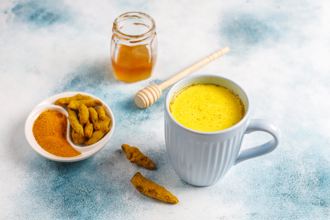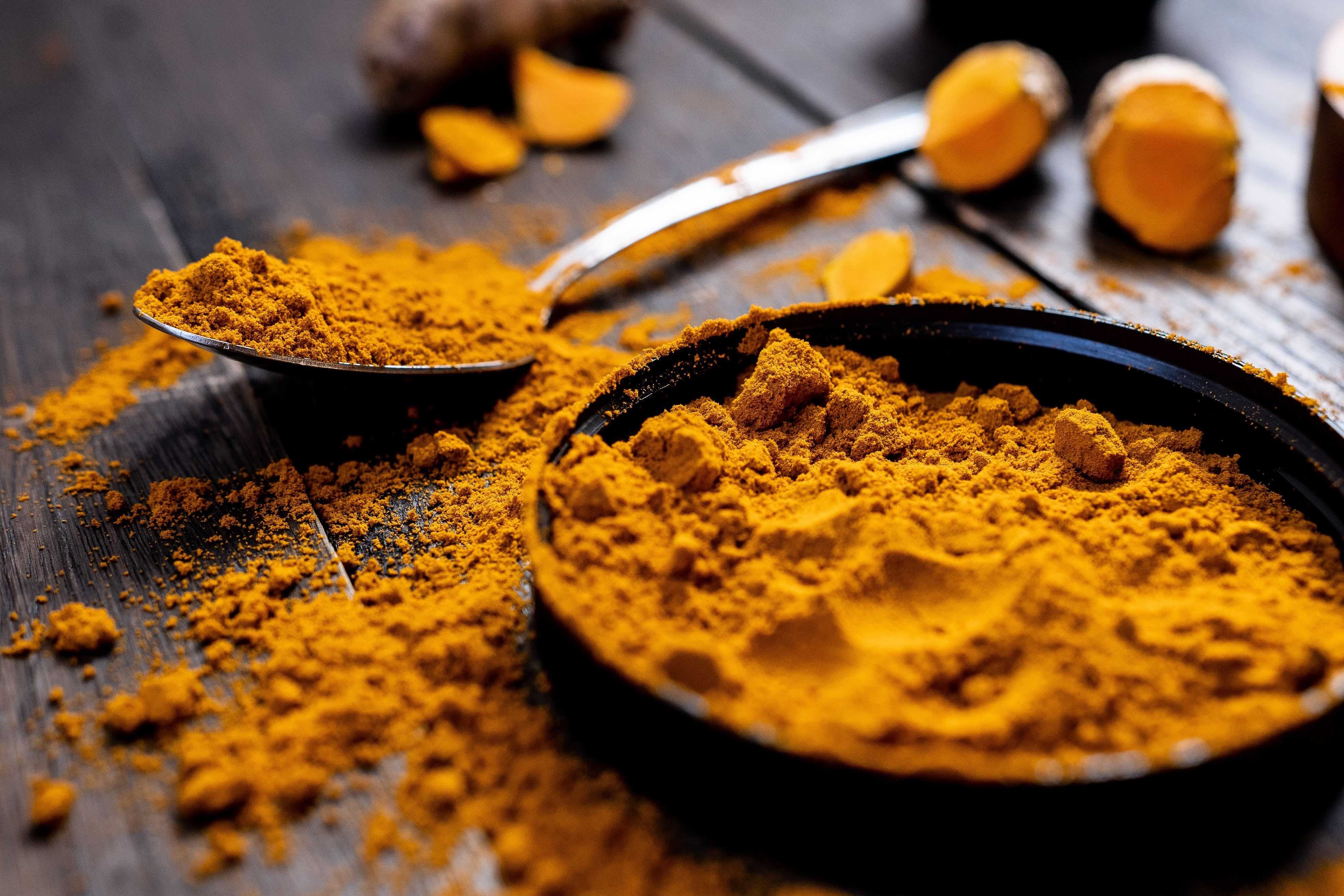Turmeric is a spice that has been used for centuries in traditional medicine to treat a variety of ailments. It is also commonly used as a culinary ingredient, giving dishes a warm and slightly bitter flavor. But beyond its delicious taste, turmeric has numerous health benefits that make it a potent addition to any diet. In this blog, we'll explore some of the many benefits of turmeric, including its anti-inflammatory and antioxidant effects, pain-relieving properties, brain-boosting benefits, and potential cancer-fighting properties. Whether you're a long-time fan of turmeric or new to this golden spice, read on to discover the incredible health benefits it can offer.
Anti-inflammatory effects:
Chronic inflammation is believed to be a contributing factor to many chronic diseases, including heart disease, cancer, and Alzheimer's disease. Turmeric's active ingredient, curcumin, has been shown to have potent anti-inflammatory effects that may help reduce the risk of these diseases.
Curcumin has been found to suppress the activity of various pro-inflammatory enzymes and cytokines in the body. One of these enzymes is cyclooxygenase-2 (COX-2), which is involved in the production of inflammatory molecules called prostaglandins. By inhibiting COX-2 activity, curcumin can reduce the production of prostaglandins, thereby reducing inflammation.
In one study, patients with rheumatoid arthritis who took curcumin supplements for eight weeks showed a significant reduction in inflammation and joint pain compared to a placebo group. Another study found that curcumin was as effective as the anti-inflammatory drug, diclofenac, in reducing pain and swelling in patients with knee osteoarthritis.
Antioxidant effects:
Turmeric is a powerful antioxidant, meaning it can help protect against oxidative damage caused by free radicals. Free radicals are unstable molecules that can cause cellular damage and contribute to aging and chronic diseases.
Curcumin has been found to have potent antioxidant properties, which can help neutralize free radicals and prevent oxidative damage. It does this by scavenging free radicals and stimulating the body's own antioxidant enzymes.
One study found that curcumin was more effective than vitamin E in preventing lipid peroxidation, a process in which free radicals damage cell membranes. Another study found that curcumin supplementation improved markers of oxidative stress in patients with type 2 diabetes.
Pain relief:
Turmeric may also offer pain relief for those suffering from conditions such as osteoarthritis and rheumatoid arthritis. Curcumin has been found to have analgesic properties, meaning it can help reduce pain.
In one study, patients with knee osteoarthritis who took a curcumin supplement for four weeks experienced a significant reduction in pain compared to a placebo group. Another study found that curcumin was as effective as the painkiller, ibuprofen, in reducing pain in patients with knee osteoarthritis.
Improved brain function:
Curcumin has been found to have brain-boosting effects by increasing levels of brain-derived neurotrophic factor (BDNF), a protein that promotes the growth and survival of neurons. This may help improve memory and cognitive function in people with age-related cognitive decline.
One study found that daily curcumin supplementation improved working memory and attention in healthy older adults. Another study found that curcumin supplementation improved memory and mood in patients with mild, age-related memory loss.
Reduced risk of heart disease:
Curcumin may also help reduce the risk of heart disease by improving endothelial function, the function of the lining of blood vessels. This can help improve blood flow and reduce the risk of blood clots, which can lead to heart attacks and strokes.
One study found that curcumin supplementation improved endothelial function in patients with type 2 diabetes. Another study found that curcumin supplementation improved endothelial function and reduced markers of inflammation in patients with metabolic syndrome.
Potential cancer-fighting properties:
Some studies suggest that curcumin may have anti-cancer properties, particularly in the prevention and treatment of colon, prostate, and breast cancer. Curcumin has been found to inhibit the growth of cancer cells and may help prevent the development of cancer by reducing inflammation and oxidative damage.
In one study, curcumin was found to inhibit the growth of colon cancer cells in a dose-dependent manner. Another study found that curcumin supplementation reduced the number of colon polyps, which are precursors to colon cancer, in patients with familial adenomatous polyposis.
While more research is needed to fully understand the potential anti-cancer effects of curcumin, these early studies are promising and suggest that turmeric may be a useful supplement for cancer prevention and treatment.
Improved digestion:
Turmeric has been used for centuries in traditional medicine to treat digestive issues such as bloating, gas, and indigestion. Curcumin may help improve digestion by increasing the production of bile, a substance that helps break down fats in the digestive system.
In one study, patients with irritable bowel syndrome (IBS) who took a curcumin supplement for eight weeks experienced a significant reduction in symptoms compared to a placebo group. Another study found that curcumin was as effective as the anti-inflammatory drug, mesalamine, in reducing symptoms in patients with ulcerative colitis.
Skin health benefits:
Turmeric may also offer benefits for skin health, particularly in reducing the appearance of acne and dark spots. Curcumin has been found to have anti-inflammatory and antimicrobial properties, which can help reduce the inflammation and bacteria that contribute to acne.
In one study, a topical cream containing curcumin was found to significantly reduce the number of acne lesions in patients with mild to moderate acne. Another study found that a curcumin supplement improved skin tone and reduced the appearance of dark spots in patients with hyperpigmentation.
Overall, turmeric and its active ingredient curcumin offer a wide range of potential health benefits, from reducing inflammation and oxidative damage to improving brain function and reducing the risk of chronic diseases such as heart disease and cancer. While more research is needed to fully understand the effects of turmeric on human health, these early studies suggest that adding turmeric to your diet may be a simple and effective way to support your overall health and well-being.
Bonus:
Boost Your Health with This Easy and Nutritious Golden Milk Recipe!
Ingredients:
- 1 cup milk
- 1 tsp turmeric powder
- 1/2 tsp cinnamon powder
- 1/2 tsp ginger powder
- 1 tsp honey (optional)

Instructions:
- In a small saucepan, heat the milk over medium heat until it starts to steam.
- Add the turmeric, cinnamon, and ginger powder and whisk to combine.
- Continue to heat the mixture, whisking occasionally, until it reaches a gentle simmer.
- Reduce the heat and let the mixture simmer for 2-3 minutes, whisking occasionally.
- Remove from heat and stir in honey, if using.
- Strain the mixture through a fine-mesh sieve to remove any lumps.
- Serve warm and enjoy!
Note: You can adjust the spices and sweetness level to your liking. Some people also like to add a pinch of black pepper, as it can enhance the absorption of curcumin in turmeric.
Discover More
Most Viewed
Christmas is a season of joy, love, and traditions. And what better way to get into the holiday spirit than through timeless carols? These musical gems have been bringing people together for generations. Here’s our ranked list of the Top 10 Christmas Caro…
Read More

















